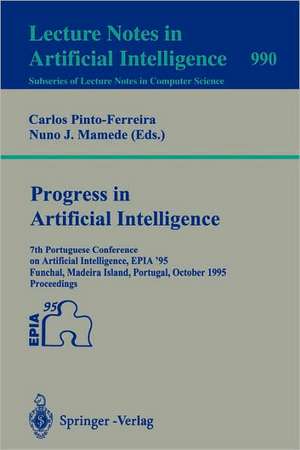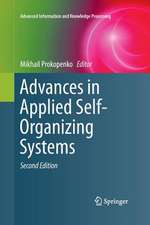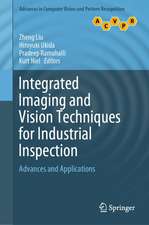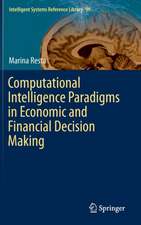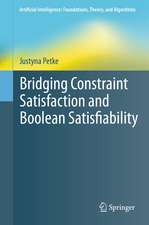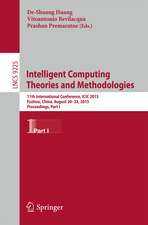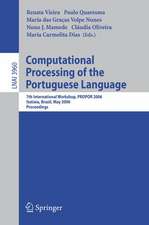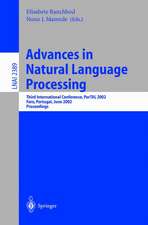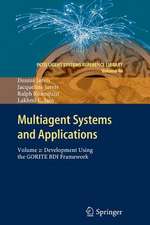Progress in Artificial Intelligence: 7th Portuguese Conference on Artificial Intelligence, EPIA '95, Funchal, Madeira Island, Portugal, October 3 - 6, 1995. Proceedings: Lecture Notes in Computer Science, cartea 990
Editat de Carlos Pinto-Ferreira, Nuno J. Mamedeen Limba Engleză Paperback – 22 sep 1995
The 30 revised full papers and the 15 poster presentations included were selected during a highly competitive selection process from a total of 167 submissions from all over the world. Among the topics covered are automated reasoning and theorem proving, belief revision, constraint-based reasoning, distributed artificial intelligence, genetic algorithms, machine learning, neural networks, non-monotonic reasoning, planning and case-based reasoning, qualitative reasoning, robotics and control, and theory of computation.
Din seria Lecture Notes in Computer Science
- 20%
 Preț: 1061.55 lei
Preț: 1061.55 lei - 20%
 Preț: 307.71 lei
Preț: 307.71 lei - 20%
 Preț: 438.69 lei
Preț: 438.69 lei - 20%
 Preț: 579.30 lei
Preț: 579.30 lei -
 Preț: 410.88 lei
Preț: 410.88 lei - 17%
 Preț: 427.22 lei
Preț: 427.22 lei - 20%
 Preț: 596.46 lei
Preț: 596.46 lei - 15%
 Preț: 448.04 lei
Preț: 448.04 lei - 20%
 Preț: 353.50 lei
Preț: 353.50 lei -
 Preț: 389.49 lei
Preț: 389.49 lei - 20%
 Preț: 309.90 lei
Preț: 309.90 lei - 20%
 Preț: 645.28 lei
Preț: 645.28 lei - 20%
 Preț: 763.23 lei
Preț: 763.23 lei - 15%
 Preț: 580.46 lei
Preț: 580.46 lei - 20%
 Preț: 310.28 lei
Preț: 310.28 lei - 20%
 Preț: 655.02 lei
Preț: 655.02 lei - 20%
 Preț: 1183.14 lei
Preț: 1183.14 lei - 20%
 Preț: 340.32 lei
Preț: 340.32 lei -
 Preț: 449.57 lei
Preț: 449.57 lei - 20%
 Preț: 591.51 lei
Preț: 591.51 lei - 18%
 Preț: 938.83 lei
Preț: 938.83 lei - 20%
 Preț: 337.00 lei
Preț: 337.00 lei - 20%
 Preț: 649.50 lei
Preț: 649.50 lei - 20%
 Preț: 607.40 lei
Preț: 607.40 lei - 20%
 Preț: 1414.79 lei
Preț: 1414.79 lei - 20%
 Preț: 1024.44 lei
Preț: 1024.44 lei - 20%
 Preț: 583.40 lei
Preț: 583.40 lei - 20%
 Preț: 453.32 lei
Preț: 453.32 lei - 20%
 Preț: 575.49 lei
Preț: 575.49 lei - 20%
 Preț: 1075.26 lei
Preț: 1075.26 lei - 20%
 Preț: 585.88 lei
Preț: 585.88 lei - 20%
 Preț: 825.93 lei
Preț: 825.93 lei - 17%
 Preț: 360.20 lei
Preț: 360.20 lei - 20%
 Preț: 763.23 lei
Preț: 763.23 lei - 20%
 Preț: 340.32 lei
Preț: 340.32 lei - 20%
 Preț: 504.58 lei
Preț: 504.58 lei - 20%
 Preț: 369.13 lei
Preț: 369.13 lei - 20%
 Preț: 580.93 lei
Preț: 580.93 lei - 20%
 Preț: 343.62 lei
Preț: 343.62 lei - 20%
 Preț: 350.21 lei
Preț: 350.21 lei - 20%
 Preț: 583.40 lei
Preț: 583.40 lei - 20%
 Preț: 583.40 lei
Preț: 583.40 lei - 15%
 Preț: 438.59 lei
Preț: 438.59 lei - 20%
 Preț: 341.95 lei
Preț: 341.95 lei - 20%
 Preț: 238.01 lei
Preț: 238.01 lei - 20%
 Preț: 538.30 lei
Preț: 538.30 lei
Preț: 342.78 lei
Preț vechi: 428.48 lei
-20% Nou
Puncte Express: 514
Preț estimativ în valută:
65.60€ • 68.23$ • 54.16£
65.60€ • 68.23$ • 54.16£
Carte tipărită la comandă
Livrare economică 14-28 aprilie
Preluare comenzi: 021 569.72.76
Specificații
ISBN-13: 9783540604280
ISBN-10: 3540604286
Pagini: 508
Ilustrații: DVIII, 492 p.
Dimensiuni: 155 x 235 x 27 mm
Greutate: 0.7 kg
Ediția:1995
Editura: Springer Berlin, Heidelberg
Colecția Springer
Seriile Lecture Notes in Computer Science, Lecture Notes in Artificial Intelligence
Locul publicării:Berlin, Heidelberg, Germany
ISBN-10: 3540604286
Pagini: 508
Ilustrații: DVIII, 492 p.
Dimensiuni: 155 x 235 x 27 mm
Greutate: 0.7 kg
Ediția:1995
Editura: Springer Berlin, Heidelberg
Colecția Springer
Seriile Lecture Notes in Computer Science, Lecture Notes in Artificial Intelligence
Locul publicării:Berlin, Heidelberg, Germany
Public țintă
ResearchCuprins
Terminological meta-reasoning by reification and multiple contexts.- A new continuous propositional logic.- Super-polynomial speed-ups in proof length by new tautologies.- Belief revision in non-monotonic reasoning.- A new representation of JTMS.- The retrieval problem in a concept language with number restrictions.- Formalizing local propagation in constraint maintenance systems.- A dependency parser of Korean based on connectionist/symbolic techniques.- A symbiotic approach to arc and path consistency checking.- Where do intentions come from ?: A framework for goals and intentions adoption, derivation and evolution.- A closer look to artificial learning environments.- Building multi-agent societies from descriptions to systems: Inter-layer translations.- GA/TS: A hybrid approach for job shop scheduling in a production system.- A controlled experiment: Evolution for learning difficult image classification.- Minimal model complexity search.- Characterization of classification algorithms.- Neurons, glia and the borderline between subsymbolic and symbolic processing.- Arguments and defeat in argument-based nonmonotonic reasoning.- A preference semantics for ground nonmonotonic modal logics.- Logical omniscience vs. logical ignorance on a dilemma of epistemic logic.- On the role of splitting and merging past cases for generation of a new solution.- Theorem proving by analogy — A compelling example.- Non-atomic actions in the situation calculus.- Planning under uncertainty: A qualitative approach.- Qualitative reasoning under uncertainty.- Systematic construction of qualitative physics-based rules for process diagnostics.- Integrated process supervision: A structured approach to expert control.- Using stochastic grammars to learn robotic tasks.- Constraint categorialgrammars.- A new translation algorithm from lambda calculus into combinatory logic.- Interlocking multi-agent and blackboard architectures.- A model theory for paraconsistent logic programming.- Promoting software reuse through explicit knowledge representations.- Efficient learning in Multi-Layered Perceptron using the Grow-And-Learn algorithm.- A non-diffident combinatorial optimization algorithm.- Modelling diagnosis systems with the logic programming.- Agreement: A logical approach to approximate reasoning.- Constructing extensions by resolving a system of linear equations.- Presenting significant information in expert system explanation.- A cognitive model of problem solving with incomplete information.- Filtering software specifications written in natural language.- Parsimonious Diagnosis in SNePS.- Syntactic and semantic filtering in a chart parser.- GA approach to solving Multiple Vehicle Routing Problem.- Multilevel refinement planning in an interval-based temporal logic.
